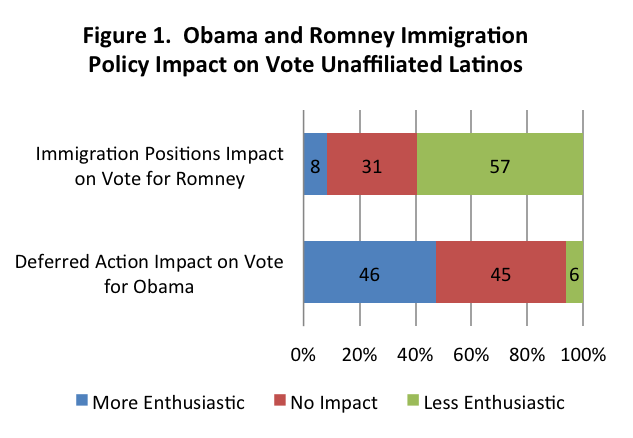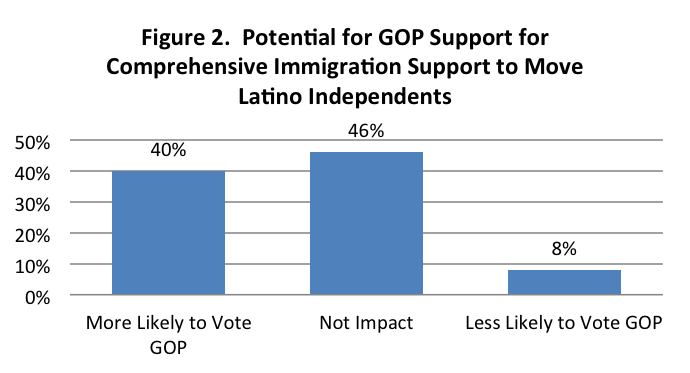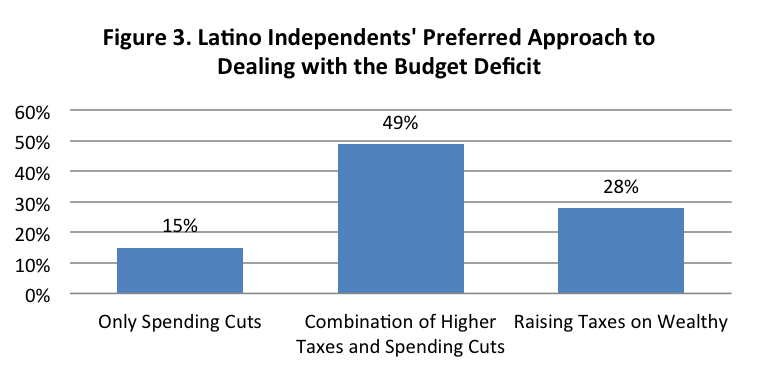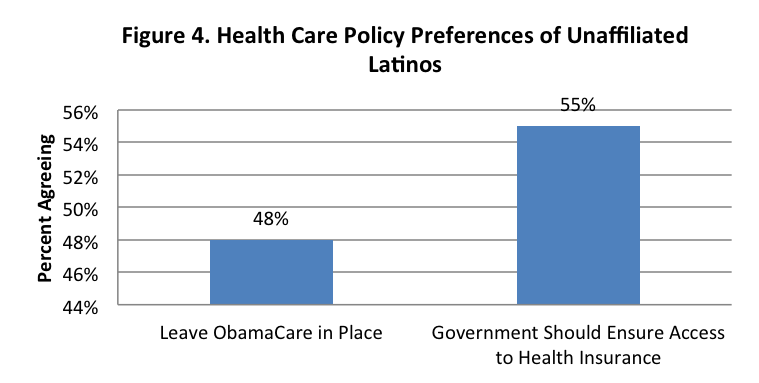The 2012 election underscored the power of the Latino vote, particularly in battleground states like Colorado, Florida and Nevada. Recent blogs here at Latino Decisions highlight the wide range of potential issues important to Latinos that federal and state elected officials now must include in their electoral and policymaking calculus, from immigration reform to environmental protection to taxation and spending. Electoral calculus hinges on potential future votes, however, and the degree to which either party’s politicians respond to Latino preferences is not only a function of base mobilization but also appealing to moveable voters. Among Latinos, and consistent with general patterns of partisanship and voting preferences, independents constitute the likely moveable voters in future elections. Focusing on the issues and preferences important to unaffiliated Latinos would thus be a wise strategy for politicians seeking electoral success in the upcoming elections.
The impreMedia/Latino Decisions election eve poll highlights the association between partisan attachment and vote choice among Latinos in 2012. Over 95% of Latino Democrats voted for Obama or the Democratic House candidate, while about 90% of Latino Republicans voted for Romney or their party’s candidate for the U.S. House. These rather normal partisan affects are the reason for representing the policy preferences of the base. Not much room exists for moving voters among Latino partisans. Unaffiliated Latinos, on the other hand, may be the best bet for parties seeking to move voters. Contrasted with the numbers above, Latino independents split their vote for Obama and Romney by 60/34, and the Democratic vs. Republican House candidate split was 60/40. Democrats still hold a strong advantage, but if the Republican Party is interested in attracting Latino voters, independents are their best bet. So, what do Latino independents want? What follows is a discussion of the results for the sample of Latino independent/unaffiliated voters from the impreMedia/Latino Decisions election eve poll (question wording and full results are available here).
Immigration
Nationally 33% of Latino independents indicated that immigration was one of the top two most important issues facing the Latino community that politicians should address. The role of immigration in unaffiliated voters’ choices reflects the broader theme of a push away from Republican positions, specifically Romney’s in the 2012 election, and a more tepid enthusiasm for the Obama Administration’s mid-campaign decision to defer deportation through the DHS directive. While Latino independents were split between reporting more enthusiasm and no impact of the DHS directive, 57% reported being less enthusiastic for Romney given his positions on immigration (Figure 1). The 2012 Republican campaign rhetoric clearly will not move Latino independents, but as Figure 2 suggests, Republicans may make inroads, as 40% report being more likely to vote for the GOP if the GOP endorses some form of comprehensive immigration reform.

 Taxation and Spending
Taxation and Spending
With the fiscal cliff quickly approaching, Latino independents’ take on a solution to the federal budget deficit and a general orientation to tax or spend politics is another aspect of policy preferences that politicians ought to pay attention to over the next several years (if not weeks or days). Latino independents tend to a combination of spending cuts and increased taxation on the wealthy as a solution, as 49% support such an approach (see Figure 3). Opinion tilts a bit toward taxing the wealthy, however, and with only 15% supporting a “spending cuts only” approach, moving unaffiliated Latinos is not likely with a cuts only policy position.
 Health Care
Health Care
Latino independents tend toward a government approach to ensuring access to health insurance and slightly favor retaining “ObamaCare”. As figure 4 shows, 48% of unaffiliated Latinos favor leaving ObamaCare in place compared to 39% supporting repeal. This is only a slight edge, so perhaps positions on ObamaCare may not move Latino independents to a great extent. However, an inclination to maintain partisan positions is offset by the 55% of unaffiliated Latinos who support a government role for ensuring health care access (Figure 4).
 Where does all this lead in terms of policies that may move Latino independents? Immigration seems the most straightforward. Unaffiliated Latinos will respond positively to parties that support comprehensive immigration reform. If Democrats want to retain Latino support, and Republicans want to pry some support away from the Democrats, moving forward with comprehensive immigration reform is a no-brainer. Latino independents also support some combination of spending cuts and taxing the wealthy as a solution to the fiscal policy crisis. While the exact nature of the combination is hard to derive from the data, a hard cuts-only position is certainly a losing strategy for moving Latino independents toward one’s party. Finally, health care policy preferences of the unaffiliated suggest that while there is some room for both GOP and Democratic positions as they stand, the tendency toward support for ObamaCare and a governmental role in ensuring health care access means limited government arguments may not play too well among Latino independents.
Where does all this lead in terms of policies that may move Latino independents? Immigration seems the most straightforward. Unaffiliated Latinos will respond positively to parties that support comprehensive immigration reform. If Democrats want to retain Latino support, and Republicans want to pry some support away from the Democrats, moving forward with comprehensive immigration reform is a no-brainer. Latino independents also support some combination of spending cuts and taxing the wealthy as a solution to the fiscal policy crisis. While the exact nature of the combination is hard to derive from the data, a hard cuts-only position is certainly a losing strategy for moving Latino independents toward one’s party. Finally, health care policy preferences of the unaffiliated suggest that while there is some room for both GOP and Democratic positions as they stand, the tendency toward support for ObamaCare and a governmental role in ensuring health care access means limited government arguments may not play too well among Latino independents.
While Latino independents not surprisingly fall between Latino Republicans and Latino Democrats on most positions, the reality is that their 60/40 split favoring Democrats means the GOP faces a tough road ahead if they are to move the unaffiliated to vote for their party’s candidates. Changes in immigration policy are possible, but retaining their base may not allow for the fiscal and health care policy shifts that would move Latino independents in substantial numbers. But perhaps the most striking obstacle for the GOP is that Latinos just do not believe the party is looking out for their community’s interests. Using the 2012 presidential candidates as proxies for their parties, a sense of the problem emerges. When asked if Obama/Romney care about the Latino community, 57% of Latino independents responded that Obama truly cares about Latinos compared to only 16% indicating Romney cares about Latinos. More striking, only 4% of unaffiliated Latinos indicated that Obama does not care about Latinos, while 53% said the same about Romney. These numbers would not matter if not for the fact that Latino independents vote to support their community more than either party. When asked the reason that best reflects their rationale for voting in 2012, 47% responded that, “I’m voting in 2012 because I wanted to support and represent the Latino community,” (the modal category and 25% more than the second place response of supporting the Democrats). All this suggests that if the parties want to retain or attract unaffiliated Latino voters, they would be wise to recognize the unique policy preferences and motivations of Latino independents. Elections determined at the margins may depend on it.
Robert R. Preuhs is an Assistant Professor of Political Science at Metropolitan State University of Denver. He has published numerous articles on state politics and minority representation. His new book, “Black-Latino Relations in U.S. National Politics,” co-authored with Rodney E. Hero, will be released by Cambridge University Press in January, 2013
The commentary of this article reflects the views of the author and do not necessarily reflect the views of Latino Decisions. Latino Decisions and Pacific Market Research, LLC make no representations about the accuracy of the content of the article.


